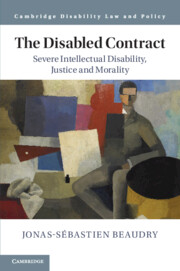
-
Select format
-
- Publisher:
- Cambridge University Press
- Publication date:
- March 2021
- March 2021
- ISBN:
- 9781316591482
- 9781107152854
- 9781316606681
- Dimensions:
- (228 x 152 mm)
- Weight & Pages:
- 0.634kg, 336 Pages
- Dimensions:
- (229 x 152 mm)
- Weight & Pages:
- 0.49kg, 336 Pages
- Subjects:
- Socio-Legal Studies, Law, Human Rights
You may already have access via personal or institutional login- Subjects:
- Socio-Legal Studies, Law, Human Rights
Book description
Social contract theories generally predicate the authority of rules that govern society on the idea that these rules are the product of a contractual agreement struck between members of society. These theories embody values, such as equality, reciprocity and rationality, that are highly prized within our culture. Yet a closer inspection reveals that these features exclude other important values, relations and even persons from the realm of contractual morality and justice, especially people with severe intellectual disabilities. Jonas-Sébastien Beaudry explores the moral status of intellectually disabled people in social contract thought and argues that this tradition needs to be revisited to include the most vulnerable. Addressing this problem will have concrete repercussions in law and policy, because many issues that people with disabilities face are connected to deeply rooted assumptions about their status as full citizens or full members of our moral, political and legal communities.
Contents
Metrics
Altmetric attention score
Full text views
Full text views help Loading metrics...
Loading metrics...
* Views captured on Cambridge Core between #date#. This data will be updated every 24 hours.
Usage data cannot currently be displayed.
Accessibility standard: Unknown
Why this information is here
This section outlines the accessibility features of this content - including support for screen readers, full keyboard navigation and high-contrast display options. This may not be relevant for you.
Accessibility Information
Accessibility compliance for the PDF of this book is currently unknown and may be updated in the future.


